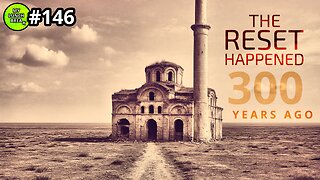Premium Only Content

Episode 3075: Why was as Pope Leo's Encyclical Rerum Novarum so prophetic
Hello and welcome back to Catholic Reboot. I am Sharon your host and Walt as the co-host and we will discuss Rerum Novarum by Pope Leo XIII. Before we get started let begin with a prayer.
Opening Prayer (Led by Sharon)
In the name of the Father, and of the Son, and of the Holy Spirit. Amen.
Heavenly Father, we come before You seeking wisdom and understanding as we discuss Pope Leo XIII's encyclical Rerum Novarum. Grant us the grace to appreciate the timeless teachings of the Church on work, family, and social justice. Enlighten our minds and open our hearts to the truths that guide us to holiness in every aspect of our lives. Through Christ our Lord. Amen.
In the name of the Father, and of the Son, and of the Holy Spirit. Amen.
________________________________________
Segment 1: Historical Context and the Purpose of Rerum Novarum
Sharon: Well Walt here we go again covering a writing you recommended we get for our home Catholic library the encyclical titled Rerum Novarum written by Pope Leo 13th one of your favorite Popes. Would you mind explaining when this encyclical was written and why it was written?
Walt: Wow! That is a lot to answer. It may take me a bit of time if that is okay?
Sharon: Sure go for it.
Walt: Ok, Rerum Novarum (Latin for "Of New Things") was promulgated by Pope Leo XIII on May 15, 1891. It was the first of the Catholic Church's major social encyclicals and laid the groundwork for Catholic social teaching in response to the significant social and economic upheavals of the time. I will provide the url link to the Vatican website for those that want to read it.
https://www.vatican.va/content/leo-xiii/en/encyclicals/documents/hf_l-xiii_enc_15051891_rerum-novarum.html
The Historical Context Leading Up to Rerum Novarum
1. The Industrial Revolution (Late 18th to 19th Century)
o Rapid industrialization led to profound changes in economic and social structures.
o Factory systems replaced traditional artisan and agricultural economies, causing mass migration to urban areas.
o Workers faced long hours, dangerous working conditions, and extremely low wages, often living in squalid conditions.
2. Capitalism and Worker Exploitation
o Unregulated capitalism prioritized profits at the expense of human dignity and workers' rights.
o The absence of labor regulations allowed for child labor, unsafe working conditions, and the exploitation of women and men.
o The concentration of wealth created vast economic inequality, fueling social unrest.
3. The Rise of Socialism and Marxism
o In response to capitalist exploitation, socialist and Marxist ideologies gained popularity.
o Socialism called for the collective ownership of property and the abolition of private property, which Pope Leo XIII viewed as contrary to human nature and destructive to the family unit.
o Karl Marx's Communist Manifesto (1848) had a significant influence on revolutionary movements worldwide.
4. Class Struggles and Labor Movements
o Workers began to organize strikes and unions to demand better wages, working conditions, and dignity.
o Labor unrest, often met with violent repression, highlighted the growing divide between the wealthy industrialists and the working poor.
5. Political Instability and Fear of Revolution
o The 19th century witnessed a series of revolutions and political upheavals in Europe (e.g., the Revolutions of 1848).
o Governments feared socialist revolutions and were often hostile to labor movements.
6. Secularization and Declining Christian Influence
o The Enlightenment and secular ideologies challenged the Church's authority and traditional social teachings.
o Materialism and utilitarian philosophies gained dominance, undermining Christian principles of justice and charity.
7. Papal Response to a Growing Crisis
o Pope Leo XIII recognized that neither unbridled capitalism nor atheistic socialism provided a moral or sustainable solution to the social crisis.
o He sought to articulate a distinctly Catholic response that upheld the dignity of work, respect for private property, and the moral duties of employers and the state.
Why Rerum Novarum Was Written
Pope Leo XIII intended Rerum Novarum to:
• Address the social consequences of industrialization and prevent the Church's marginalization in socio-economic issues.
• Provide a moral and ethical framework for the economic and social order based on Catholic teaching.
• Protect the rights and dignity of workers while affirming the legitimacy of private property.
• Counteract the dangerous allure of socialism and communism by offering a Christian alternative.
• Guide Catholics in engaging with social issues in a way that fosters justice, peace, and human flourishing.
Rerum Novarum ultimately became the blueprint for Catholic social teaching, influencing papal documents and social movements for generations.
Sharon: That was a complete explanation, so we know when it was written and why. Quick question, do Popes actually research and write their own Encyclicals?
Walt: In most cases, no. Popes generally do not work in isolation when writing encyclicals. While they often set the themes, structure, and essential theological points, much of the research and drafting process is typically carried out by a team of theologians, advisors, and Vatican officials. These collaborators are often members of the Pope’s personal staff, the Secretariat of State, or experts from various Pontifical Academies and Dicasteries.
The typical process:
1. Papal Vision and Concept
• The Pope identifies the central topic or issue to address, often in response to theological, pastoral, or global concerns.
• He may outline specific themes or points he wants to emphasize based on his spiritual insights and pastoral priorities.
2. Research and Drafting
• Teams of theologians, scholars, and Vatican officials gather references from Scripture, Church Fathers, canon law, previous Church documents, and other authoritative sources.
• Drafts are prepared based on the Pope’s directives.
3. Papal Review and Edits
• The Pope carefully reviews the drafts, suggesting edits and clarifications to ensure they align with his teachings and intentions.
• Significant theological and doctrinal content is often fine-tuned by the Pope himself.
4. Consultation and Revisions
• Additional consultations with trusted advisors or bishops may occur, especially if the encyclical addresses complex global or moral issues.
• Revisions are made based on feedback to ensure clarity and fidelity to Church teaching.
5. Final Approval and Release
• Once the Pope is satisfied with the document, he gives his formal approval, and it is released as a papal encyclical.
Examples of Papal Involvement
Some popes have been particularly hands-on with their encyclicals. For example:
• Pope Benedict XVI, a renowned theologian, was deeply involved in writing his encyclicals, often contributing substantial theological insights.
• Pope John Paul II was also heavily involved in the drafting process, given his philosophical background.
• Pope Francis is known for consulting widely and incorporating practical pastoral concerns, though he maintains strong involvement in shaping the final document.
Pope Leo XIII played a central and highly significant role in the development of Rerum Novarum. His involvement can be characterized by his theological vision, intellectual leadership, and hands-on approach to its drafting and final content.
Context and Inspiration
Pope Leo XIII was deeply concerned about the social and economic issues of the late 19th century, including:
• The rise of industrial capitalism and its exploitation of workers.
• The spread of socialism and Marxism as radical alternatives to economic inequality.
• The decline of Christian social values in the face of secularization and class conflict.
Leo XIII sought to articulate a Catholic response to these challenges that would:
• Defend the rights and dignity of workers.
• Uphold the importance of private property.
• Advocate for cooperation between classes rather than class struggle.
His Intellectual Leadership
• Pope Leo XIII was a highly educated and intellectually inclined pontiff, deeply influenced by St. Thomas Aquinas and the natural law tradition.
• His emphasis on the compatibility between reason, faith, and social justice shaped the core philosophical framework of Rerum Novarum.
Writing Process
1. Consultation with Experts
o Pope Leo XIII consulted theologians, scholars, and members of the Vatican Curia to gather insights on economic and social issues.
o Key advisors included Tommaso Maria Zigliara, a Thomist philosopher, and Giuseppe Toniolo, an economist and sociologist with expertise in Catholic social thought.
2. Drafting and Papal Revisions
o Initial drafts were prepared by his trusted advisors based on Leo XIII's theological framework and concerns.
o Pope Leo XIII personally reviewed the drafts and made significant contributions, particularly in clarifying the Church's position on private property, the moral obligations of employers and workers, and the dangers of socialism.
3. Final Approval and Theological Refinement
o Leo XIII ensured that the final document upheld the Church's traditional teachings while responding to contemporary issues with a forward-looking vision.
o His distinctive voice is evident throughout the encyclical, especially in the passages defending the sanctity of the family, the role of the state, and the principles of distributive justice.
Key Contributions by Pope Leo XIII
• Defense of Private Property: He firmly emphasized the natural right to own property as a safeguard against socialism.
• Workers' Rights: He insisted on the right to just wages, reasonable working hours, and safe working conditions.
• Subsidiarity and Solidarity: He highlighted the importance of intermediate bodies, like guilds, in fostering cooperation between workers and employers.
• Moral and Spiritual Dimension: His Thomistic approach integrated moral theology with social justice, emphasizing that social order must be rooted in divine and natural law.
Legacy
Pope Leo XIII's personal engagement with Rerum Novarum ensured its enduring relevance. It served as the foundation for later social encyclicals such as Quadragesimo Anno by Pope Pius XI and Centesimus Annus by Pope John Paul II.
Sharon: Ok so to summarize, Pope Leo 13th insights laid the foundation for Catholic social teaching. Do you mind if we break down the key themes.
________________________________________
Segment 2: The Dignity of Work and Rights of Workers
Sharon: One of the main points of Rerum Novarum is the dignity of work. Pope Leo XIII taught that work isn't just a means to survive but a fundamental part of human dignity.
Walt: Exactly. He emphasized that workers deserve a just wage, one sufficient to support themselves and their families. Exploitation through inadequate wages is described as a crime against Heaven.
Sharon: He even said, “To defraud anyone of wages that are his due is a great crime which cries to the avenging anger of Heaven.” (Rerum Novarum, 17).
Walt: And he wasn't only concerned with wages. Pope Leo XIII called for safe working conditions, adequate rest, and the right for workers to form unions.
Sharon: Unions, however, must operate within moral boundaries and respect the common good. The Church doesn't support unions that become corrupt or disruptive.
________________________________________
Segment 3: Private Property and Its Moral Justification
Walt: Another key theme is the defense of private property. Pope Leo XIII recognized private ownership as a natural right essential for human freedom and family stability.
Sharon: And he pointed out that ownership carries responsibilities. Wealth and property must be used for the common good, not just personal gain.
Walt: One of my favorite quotes from this section is, “The rich must remember that their wealth is not intended merely for their own good. It should benefit others as well.” (Rerum Novarum, 22)
Sharon: It's a beautiful reminder that stewardship is a moral obligation, a concept often lost in modern economic systems.
________________________________________
Segment 4: Critique of Socialism
Sharon: The encyclical also takes a firm stance against socialism.
Walt: Pope Leo XIII saw socialism's attempt to abolish private property as a violation of natural law. He argued that collective ownership would destabilize society and harm families.
Sharon: He even warned that socialism would lead to state interference in family life and cause social disorder.
Walt: It's clear that socialism's rejection of personal property is incompatible with Catholic teaching on the dignity of the family and individual freedom.
________________________________________
Segment 5: The Role of the State
Sharon: Pope Leo XIII also spoke about the role of the state in economic and social life.
Walt: He believed the state must protect the rights of all citizens, especially the poor and vulnerable. But—and this is important—the state should avoid overreach.
Sharon: The encyclical essentially foreshadows the principle of subsidiarity. Higher authorities should only step in when lower entities are unable to fulfill their responsibilities.
________________________________________
Segment 6: Solidarity, Subsidiarity, and the Importance of the Family
Sharon: Though not explicitly named in Rerum Novarum, the principles of solidarity and subsidiarity are present throughout.
Walt: Solidarity emphasizes cooperation between social classes, while subsidiarity respects the initiative of individuals and communities.
Sharon: And Pope Leo XIII highlighted the family as the cornerstone of society. He wrote, “No father would be willing to bring up children with the prospect of their sharing, or not sharing, in property which he himself has acquired by his own labor.” (Rerum Novarum, 13)
Walt: A stable family is essential for a just and moral society.
________________________________________
Segment 7: Legacy and Impact of Rerum Novarum
Sharon: Rerum Novarum paved the way for other important papal documents.
Walt: Yes, it directly influenced encyclicals like Quadragesimo Anno by Pope Pius XI and Centesimus Annus by Pope John Paul II.
Sharon: Beyond the Church, it inspired labor rights movements and Catholic social activism worldwide.
Walt: And its message remains relevant as we face modern economic challenges.
________________________________________
Conclusion and Final Reflection
Sharon: What a rich discussion, Walt. Pope Leo XIII's wisdom continues to guide us today.
Walt: Absolutely. His emphasis on the dignity of work, the role of the family, and the proper role of the state offers timeless truths.
Sharon: Let's end with a prayer.
________________________________________
Closing Prayer (Led by Sharon)
In the name of the Father, and of the Son, and of the Holy Spirit. Amen.
Lord, we thank You for the wisdom of Pope Leo XIII and the guidance of the Church in matters of social justice and human dignity. Help us to live out these teachings in our daily lives, promoting justice, charity, and peace. Bless all workers, families, and those in positions of authority. May Your truth always guide us. Through Christ our Lord. Amen.
In the name of the Father, and of the Son, and of the Holy Spirit. Amen.
Sharon: Thank you for joining us today as we explored the timeless wisdom of Pope Leo XIII's encyclical Rerum Novarum. Let us take these teachings to heart and remember the dignity of work, the sanctity of family, and the importance of upholding justice and charity in our daily lives. May we always strive to build a society that reflects the love and truth of Christ. Now lets go out and teach somebody!
-
 LIVE
LIVE
World2Briggs
56 minutes agoThe US This Week
223 watching -
 3:10:06
3:10:06
Nikko Ortiz
4 hours agoHAMAS Gaza Peace Deal And MORE.... Brutally Honest EP #17 | Rumble LIVE
66.9K44 -
 25:10
25:10
MYLUNCHBREAK CHANNEL PAGE
5 hours agoIstanbul Should NOT Exist - Pt 4
10.7K5 -
 LIVE
LIVE
tminnzy
4 hours agoDROPS ON - BO7 BETA ALL DAY! #BlackOps7
58 watching -
 1:35:48
1:35:48
Jeff Ahern
4 hours ago $8.15 earnedThe Saturday Show with Jeff Ahern
57K5 -
 LIVE
LIVE
GritsGG
5 hours agoWarzone Win Grinding! Most Wins in WORLD! 3680+!
137 watching -
 55:45
55:45
Tactical Advisor
4 hours agoNew Product Alert! | Vault Room Live Stream 040
44.6K4 -
 3:30:37
3:30:37
Reidboyy
4 hours ago $1.33 earnedTHEY GOT RID OF SBMM WTF!?!? (Go Phillies)
19.2K -
 LIVE
LIVE
The Company Boyz
3 hours agoDying Light: The Beast | Ja Pierdole, Kurwa Bober!
64 watching -
![Mr & Mrs X - Feminism, Family, Federal Reserve, The Rise Of The [DS] Agenda](https://1a-1791.com/video/fwe2/12/s8/1/6/F/R/n/6FRnz.0kob-small-Mr-and-Mrs-X-Feminism-Famil.jpg) 58:10
58:10
X22 Report
11 hours agoMr & Mrs X - Feminism, Family, Federal Reserve, The Rise Of The [DS] Agenda
198K53
